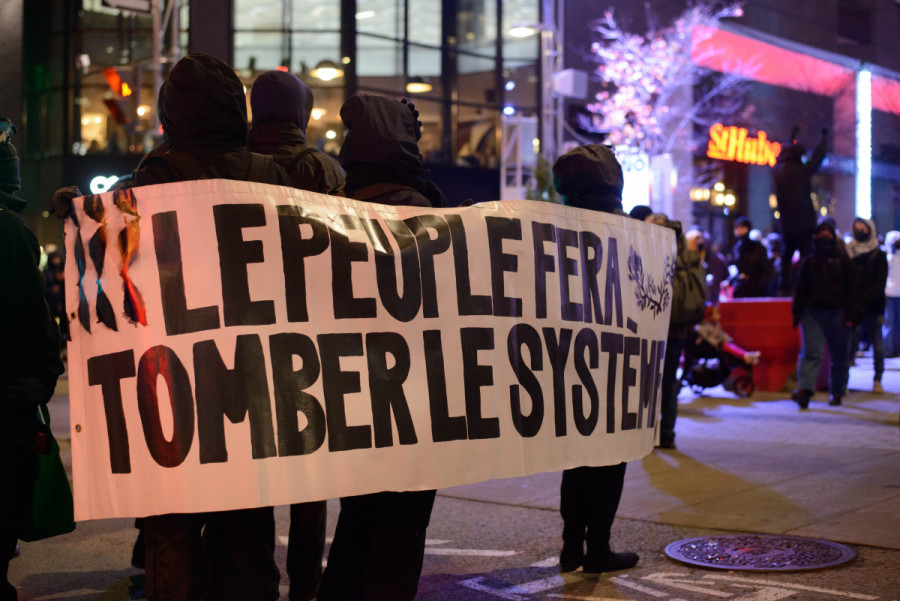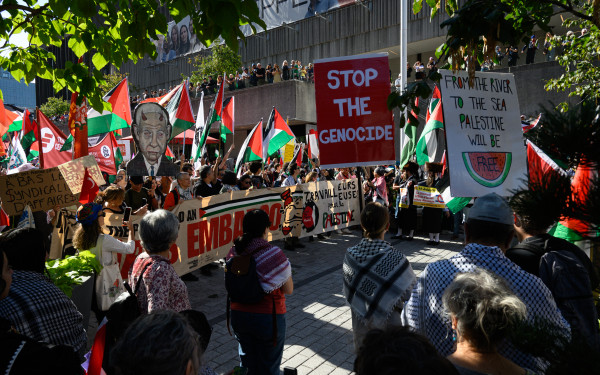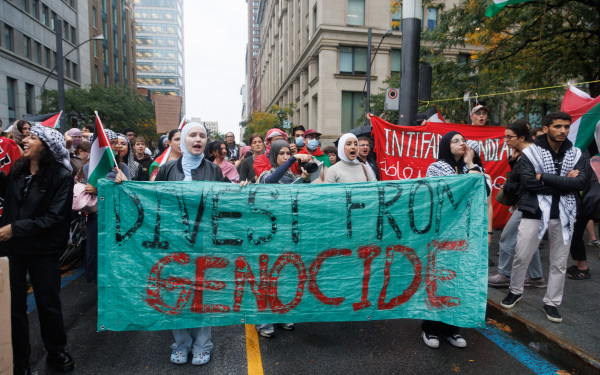Anti-NATO protest ends in three arrests
Protesters and student strikers gathered in downtown Montreal in resistance against the NATO Parliamentary Assembly
On Nov. 22, around 800 people gathered in downtown Montreal to protest the 70th Annual Session of the North Atlantic Treaty Organization (NATO) Parliamentary Assembly, which is being held in the city between Nov. 22 and Nov. 25.
The protest was organized by Convergences des Luttes Anticapitalistes (CLAC) and Divestment for Palestine (D4P). The CLAC is an association that works to disseminate anti-capitalist, anti-oppressive, anti-authoritarian, and anti-colonial ideas and practices, while D4P is a collective of citizens, militants and civil society groups engaged in the Palestinian cause. Their slogans, “No to militarism!”, “No to imperialism!” and “No to colonialism!” were chanted during the protest.
Throughout the night, two vehicles were burned, and protesters vandalized the Palais des congrès building and smashed windows. Policemen were present on foot, horses and bikes, as well as a Special Weapons and Tactics (SWAT) team. At least three protesters were arrested.
Soon after the start of the protest, police clashed with protesters, with hundreds of SPVM officers deploying several cans of tear gas to attempt to restrain protesters. Photos on social media show police officers beating protesters.
On social media, the protest received intense backlash, with government officials calling the demonstration anti-Semitic. Organizers denied the claims, calling the accusations a “dishonest attempt by politicians to hijack the political message of Nov. 22.” The organization also stated that the accusations of antisemitism during the protest aimed to delegitimize the solidarity movement for Palestine and undermine the fight against antisemitism.
“We are manifesting against NATO’s support in the Palestinian genocide,” said Lily, a protester who was granted full name anonymity for safety reasons. “International attention is directed towards Montreal right now, so we might as well take this chance to show the people’s opinions.”
The assembly is an opportunity for Canada to reaffirm its commitment to NATO values. Canada, being a founding member of NATO in 1949, is a key member of the alliance due to its strategic geographic position and due to the Canadian Armed Forces having participated in most NATO operations throughout its history.
The Nov. 22-Nov. 25 assembly comes at a time when NATO is pressuring Canada to increase its share of its gross domestic product (GDP) to the Canadian armed forces. Canada continues to fall short of the 2 per cent target that was set out for NATO members, with only 1.34 per cent of its GDP being spent on the military.
NATO’s pressure on Canada to spend more on its military is one of the reasons protesters were marching.
“For us, it is unacceptable that we invest the money of the people into military spending when it is needed in other social services like education and health care,” CLAC organizer Benoît Allard said.
The protest also comes as the genocide in Palestine persists, with Canada remaining complicit through its weapon sales to Israel. The CLAC’s manifesto states that it is “through military support for Zionist forces that NATO is able to maintain a strategic foothold in the Middle East, in order to advance the political and economic interests of its members.”
According to Allard, protesters disagree with NATO keeping close ties with the State of Israel.
“[Israel] is continuously violating the rights of the Palestinian people with the concrete support of NATO’s military resources, which Canada is a part of,” Allard said.
The protest coincided with the student strike for Palestine happening across Montreal, and as such many students were present at the anti-NATO protest.
“What we are seeing now is multiple movements converging around a similar message and claim against militarism and imperialism,” Allard said. “All in solidarity with the people worldwide who are resisting their oppressors.”
Imane Marzaq, a 19-year-old striker from Cégep Marie-Victorin, expressed her thoughts on the two campaigns intersecting.
“We want everyone to be united, the people and students alike,” Marzaq said. “To stop the genocide in Gaza, we need to stop the corruption [of governments].”
Marzaq isn’t the only one who thinks collective action is needed.
“We all want things to change,” said Amira Ikkour, another striker from Marie-Victorin. “We want to prove that it is not the government that is in power, it is the people who are.”
Coming from a place of privilege, Lily feels that it is her duty as a Canadian citizen to protest.
“It concerns us all because Canada is complicit in this genocide,” she said.
Allard hopes to send a clear message to NATO delegates that the citizens are united and want to be heard.
“For us, peace is not built from arms,” Allard said. “It is built from justice and solidarity between peoples, and through immense passion and resistance towards oppression.”







